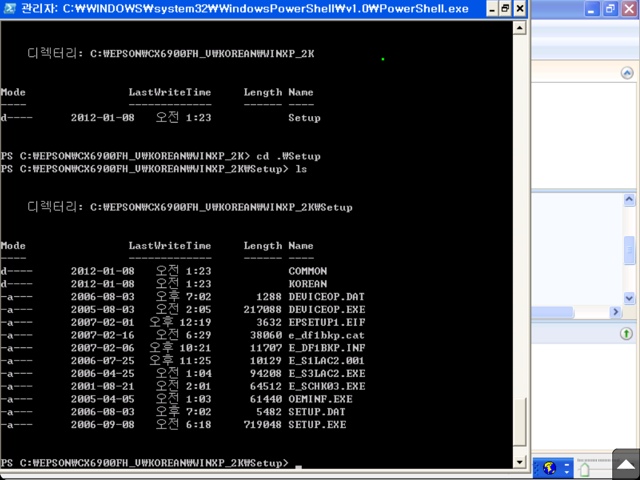파워쉘의 출력에 대하여
커맨드라인과 파워셀의 출력 차이점
커멘드라인과 파워쉘은 언뜻 살펴보기에는 동일한 방식으로 동작하는 것 처럼 보이지만 실제로는 입출력 대상에 큰 차이점이 있다, 먼저 이부분을 살펴보자
커멘드라인의 출력
커맨드라인은 에러와 기본출력 두가지를 가지고 있다, 그냥 단순하게 생각해서 문자열을 출력한다고 생각하면된다
dir > result.txt => 디렉토리 목록을 조회하여 result.txt로 저장
copy result.txt con => result.txt를 con로 카피
dir | more => 디렉토리 목록을 출력하는데 페이지 단위로 나누어서 출력한다
copy con test.txt => 콘솔로 입력받은 내용을 text.txt로 저장한다
위 예제에서 보이는것 처럼 모든 입출력은 문자열로 출력, 입력된다
파워쉘의 출력
ls 즉 get-childitem의 alias를 실행 해보면 보기에는 dir과 같은 내용이 출력되는 것 같지만
실제로는 get-childitem으로 얻어진 객체(.NETFRAMEWORK상의 객체) 리스트가 만들어지고 각 객체들의 프로퍼티중 Console로 출력되도록 설정된 프로퍼티가 출력되는 것이다
즉 cmd의 dir은 화면에 보여지는 정보가 전부이며 그 형식은 문자열이다
하지만 파워쉘은 눈에 보이는 출력이 전부가 아니라 각 객체의 프로퍼티중 보여지도록 설정된 부분만 보여지는 것이다
객체의 타입 살펴보기
사실 출력만 객체가 아니라 대부분 모든것이 객체이며 그 형식과 멤버를 가지고 있다
PS C:\Users\dirtyvictory> "test".gettype()
IsPublic IsSerial Name BaseType
-------- -------- ---- --------
True True String System.Object
PS C:\Users\dirtyvictory> (get-item .\Desktop).gettype()
IsPublic IsSerial Name BaseType
-------- -------- ---- --------
True True DirectoryInfo System.IO.FileSystemInfo
모든게 객체라니..
눈에 보이지 않는 모든 속성을 살펴보기
$item = get-item test.txt
get-member -inputobject $item
위 형식으로 특정파일을 get-item 으로 얻어온 객체를 $item이란 변수에 저장한 이후
get-member -inputobject로 출력해보면 실제로 눈에 보이는것 이외에 모든 멤버들을 볼 수 있다
PS C:\temp> Get-Member -InputObject $item
TypeName: System.IO.FileInfo
Name MemberType Definition
---- ---------- ---------- Mode CodeProperty System.String Mode{get=Mode;} AppendText Method System.IO.StreamWriter AppendText()
CopyTo Method System.IO.FileInfo CopyTo(string destFileName), System.IO.FileInfo CopyTo(string destFileName, bool...Create Method System.IO.FileStream Create() CreateObjRef Method System.Runtime.Remoting.ObjRef CreateObjRef(type requestedType) CreateText Method System.IO.StreamWriter CreateText() Decrypt Method System.Void Decrypt() Delete Method System.Void Delete()
Encrypt Method System.Void Encrypt() Equals Method bool Equals(System.Object obj)
GetAccessControl Method System.Security.AccessControl.FileSecurity GetAccessControl(), System.Security.AccessControl.FileSe...GetHashCode Method int GetHashCode()
GetLifetimeService Method System.Object GetLifetimeService()
GetObjectData Method System.Void GetObjectData(System.Runtime.Serialization.SerializationInfo info, System.Runtime.Seria...GetType Method type GetType()
InitializeLifetimeService Method System.Object InitializeLifetimeService()
MoveTo Method System.Void MoveTo(string destFileName) Open Method System.IO.FileStream Open(System.IO.FileMode mode), System.IO.FileStream Open(System.IO.FileMode mo...OpenRead Method System.IO.FileStream OpenRead() OpenText Method System.IO.StreamReader OpenText()
OpenWrite Method System.IO.FileStream OpenWrite()
Refresh Method System.Void Refresh() Replace Method System.IO.FileInfo Replace(string destinationFileName, string destinationBackupFileName), System.IO...SetAccessControl Method System.Void SetAccessControl(System.Security.AccessControl.FileSecurity fileSecurity) ToString Method string ToString()
PSChildName NoteProperty System.String PSChildName=test.txt
PSDrive NoteProperty System.Management.Automation.PSDriveInfo PSDrive=C PSIsContainer NoteProperty System.Boolean PSIsContainer=False
PSParentPath NoteProperty System.String PSParentPath=Microsoft.PowerShell.Core\FileSystem::C:\temp PSPath NoteProperty System.String PSPath=Microsoft.PowerShell.Core\FileSystem::C:\temp\test.txt PSProvider NoteProperty System.Management.Automation.ProviderInfo PSProvider=Microsoft.PowerShell.Core\FileSystem Attributes Property System.IO.FileAttributes Attributes {get;set;}
CreationTime Property System.DateTime CreationTime {get;set;}
CreationTimeUtc Property System.DateTime CreationTimeUtc {get;set;}
Directory Property System.IO.DirectoryInfo Directory {get;}
DirectoryName Property System.String DirectoryName {get;}
Exists Property System.Boolean Exists {get;}
Extension Property System.String Extension {get;}
FullName Property System.String FullName {get;}
IsReadOnly Property System.Boolean IsReadOnly {get;set;} LastAccessTime Property System.DateTime LastAccessTime {get;set;}
LastAccessTimeUtc Property System.DateTime LastAccessTimeUtc {get;set;} LastWriteTime Property System.DateTime LastWriteTime {get;set;} LastWriteTimeUtc Property System.DateTime LastWriteTimeUtc {get;set;} Length Property System.Int64 Length {get;} Name Property System.String Name {get;} BaseName ScriptProperty System.Object BaseName {get=if ($this.Extension.Length -gt 0){$this.Name.Remove($this.Name.Length -...VersionInfo ScriptProperty System.Object VersionInfo {get=[System.Diagnostics.FileVersionInfo]::GetVersionInfo($this.FullName);}
모든 리다이렉션과 출력, 입력은 객체로 이루어진다 문자열을 입력하더라도 결국 문자열은 .NETFRAMEWORK의 string객체로 바뀌어 처리된다
이후 파워쉘의 리다이렉션과 스크립트상의 문법에 대하여 알아보자
'Server Story.... > PowerShell' 카테고리의 다른 글
| 파워쉘로 리모트에 gui화면 실행 (0) | 2013.03.29 |
|---|---|
| 파워쉘의 기본문법1 (0) | 2013.03.29 |
| 스크립트 파일을 실행하기 위한 설정 (0) | 2013.03.29 |
| 파워쉘 실행 (0) | 2013.03.29 |
| 파워쉘 비밀번호 암호화 (0) | 2013.03.29 |
